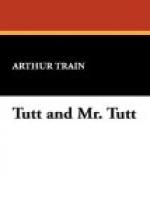“I know some rats and mice I’d like to have exorcised,” mused Tutt.
“At Autun in the fifteenth century the rats won their case,” said Mr. Tutt.
“Who got ’em off?” asked Tutt.
“M. Chassensee, the advocate appointed to defend them. They had been a great nuisance and were ordered to appear in court. But none of them turned up. M. Chassensee therefore argued that a default should not be taken because all the rats had been summoned, and some were either so young or so old and decrepit that they needed more time. The court thereupon granted him an extension. However, they didn’t arrive on the day set, and this time their lawyer claimed that they were under duress and restrained by bodily fear—of the townspeople’s cats. That all these cats, therefore should first be bound over to keep the peace! The court admitted the reasonableness of this, but the townsfolk refused to be responsible for their cats and the judge dismissed the case!”
“What did Chassensee get out of it?” inquired Tutt.
“There is no record of who paid him or what was his fee.”
“He was a pretty slick lawyer,” observed Tutt. “Did they ever try birds?”
“Oh, yes!” answered Mr. Tutt. “They tried a cock at Basel in 1474—for the crime of laying an egg.”
“Why was that a crime?” asked Tutt. “I should call it a tour de force.”
“Be that as it may,” said his partner, “from a cock’s egg is hatched the cockatrice, or basilisk, the glance of whose eye turns the beholder to stone. Therefore they tried the cock, found him guilty and burned him and his egg together at the stake. That is why cocks don’t lay eggs now.”
“I’m glad to know that,” said Tutt. “When did they give up trying animals?”
“Nearly two hundred years ago,” answered Mr. Tutt. “But for some time after that they continued to try inanimate objects for causing injury to people. I’ve heard they tried one of the first locomotives that ran over a man and declared it forfeit to the crown as a deodand.”
“I wonder if you couldn’t get ’em to try Andrew,” hazarded Tutt, “and maybe declare him forfeited to somebody as a deodand.”
“Deodand means ‘given to God,’” explained Mr. Tutt.
“Well, I’d give Andrew to God—if God would take him,” declared Tutt devoutly.
“But who is Andrew?” asked Mr. Tutt.
“Andrew is a dog,” said Tutt, “who bit one Tunnygate, and now the Grand Jury have indicted not the dog, as it is clear from your historical disquisition they should have done, but the dog’s owner, Mr. Enoch Appleboy.”
“What for?”
“Assault in the second degree with a dangerous weapon.”
“What was the weapon?” inquired Mr. Tutt simply.
“The dog.”
“What are you talking about?” cried Mr. Tutt. “What nonsense!”
“Yes, it is nonsense!” agreed Tutt. “But they’ve done it all the same. Read it for yourself!” And he handed Mr. Tutt the indictment.




